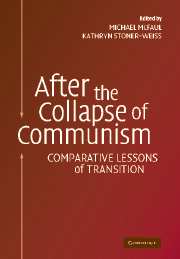Book contents
- Frontmatter
- Contents
- Contributors
- Introduction: The Evolving Social Science of Postcommunism
- 1 The Triumph of Nation-States: Lessons from the Collapse of the Soviet Union, Yugoslavia, and Czechoslovakia
- 2 The Fourth Wave of Democracy and Dictatorship: Noncooperative Transitions in the Postcommunist World
- 3 Circumstances versus Policy Choices: Why Has the Economic Performance of the Soviet Successor States Been So Poor?
- 4 Whither the Central State? The Regional Sources of Russia's Stalled Reforms
- 5 Parties, Citizens, and the Prospects for Democratic Consolidation in Russia
- 6 Comparative Democratization: Lessons from Russia and the Postcommunist World
- 7 Russians as Joiners: Realist and Liberal Conceptions of Postcommunist Europe
- Index
7 - Russians as Joiners: Realist and Liberal Conceptions of Postcommunist Europe
Published online by Cambridge University Press: 07 September 2011
- Frontmatter
- Contents
- Contributors
- Introduction: The Evolving Social Science of Postcommunism
- 1 The Triumph of Nation-States: Lessons from the Collapse of the Soviet Union, Yugoslavia, and Czechoslovakia
- 2 The Fourth Wave of Democracy and Dictatorship: Noncooperative Transitions in the Postcommunist World
- 3 Circumstances versus Policy Choices: Why Has the Economic Performance of the Soviet Successor States Been So Poor?
- 4 Whither the Central State? The Regional Sources of Russia's Stalled Reforms
- 5 Parties, Citizens, and the Prospects for Democratic Consolidation in Russia
- 6 Comparative Democratization: Lessons from Russia and the Postcommunist World
- 7 Russians as Joiners: Realist and Liberal Conceptions of Postcommunist Europe
- Index
Summary
Immediately after the collapse of communism in Europe, many students of international relations predicted a return to balance-of-power politics among the great European powers. Others foresaw new balancing between the United States and Europe as the international system moved from a bipolar order to a multipolar world. A decade later, the distinguished observer Joseph Joffe argued that Western Europe and Russia might join together to offset American power: “Ten years after victory in the cold war, the United States is still No. 1 by any conceivable measure. But the lesser actors – Russia, Europe, China – are beginning to make true what history and political theory have predicted all along: Great powers will generate ‘ganging up.’ Nos. 2, 3, and 4 will seek to balance against Mr. Big.” And a recent book by a leading Europe scholar, Charles Kupchan, predicts that a united Europe will emerge as America's main long-term strategic challenger.
Joffe, Kupchan, and other realists like John Mearsheimer and Kenneth Waltz eventually may be right. Perhaps the German, French, and Russian coalition during the 2003 Iraq war is just the beginning. In the future, realpolitik and balance of power may return as the organizing principles of international politics on the European continent. Someday, the “lesser” powers may seek to balance against the United States. To date, however, what is more striking is how wrong these realist predictions since 1989 have proven to be.
- Type
- Chapter
- Information
- After the Collapse of CommunismComparative Lessons of Transition, pp. 232 - 256Publisher: Cambridge University PressPrint publication year: 2004
- 4
- Cited by



